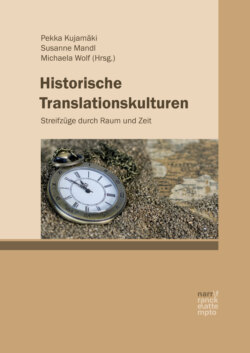Читать книгу Historische Translationskulturen - Группа авторов - Страница 41
3.4 Manx, Cornish and Breton
ОглавлениеThe literature on Celtic-language translation tends to focus on Irish, Scottish Gaelic and Welsh, with considerably less research available on Manx, Cornish and Breton. Reference works such as the Encyclopedia of Literary Translation into English (Classe 2000) or The Oxford guide to literature in English translation (France 2000) offer dedicated sections on each of the former, with the latter three mentioned only in passing.
Although Cornish was no longer spoken as a living language, and very little written Cornish has survived, there were a handful of translations carried out in the nineteenth century, many of which Constantine (2009: 303–304) sees as “dry [and doing] little justice to the flashes of humour and beauty of the originals”. However, such literal translations served to awaken interest in the language and contributed to the small-scale revival of spoken Cornish that would take place in the following decades.
Partly due to the rapid decline of the Manx language in the nineteenth century and also due to the comparatively small corpus of literature, few translations were written at the time of the Celtic Revival. A.W. Moore is the most prominent translator of the time, publishing collections of folk songs and traditional Manx carols entitled Carvalyn Gailckagh (1891) and Manx Ballads and Music (1896).
As the only remaining Celtic language whose decline makes way for a language other than English, Breton tended to be translated into/out of French rather than English, and translations of Breton work into English were often based on French translations of the original. A key figure in the context of the current research was Anatole Le Braz, a Breton poet who translated old Breton songs, poems and stories into French and published his own poetry in French from 1888, as well as being chair of the Union régionaliste bretonne (Breton Regionalist Union). Another member of the Union, François Taldir-Jaffrennou, is seen as the leader of the Breton bardic movement which emerged at the beginning of the twentieth century. He wrote not only in Breton and French, but occasionally also in Welsh. He is responsible for the unofficial “national anthem” of Brittany, Bro Gozh ma Zadoù (Old Land of My Fathers), which he translated from the Welsh national anthem. Favereau (2007: 131) sees Jean-Pierre Calloc’h as “the most gifted poet of his generation”. He wrote in Breton, and his volume of poetry Ar en Deulin was published posthumously accompanied by French translations in 1925.
| Manx, Cornish and Breton – Overview What was translated: – More common to translate out of the languages – Indirect translations into English – Songs, poetry and stories Reasons for translation activity: – Revive Manx, Cornish and Breton literature and culture – Disseminate Manx, Cornish and Breton literature and culture in the Isle of Man, Cornwall and Brittany as well as internationally Translators: – A.W. Moore – Anatole Le Braz – François Taldir-Jaffrennou – Jean-Pierre Calloc’h Aim/Outcome: – Revived interest in language and culture |
